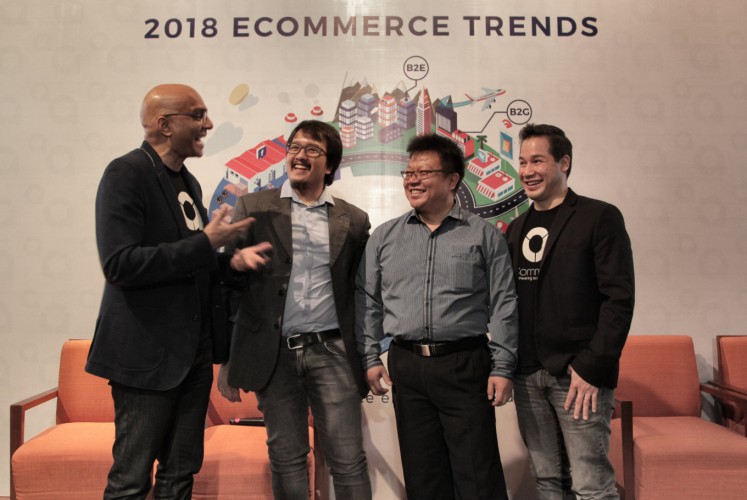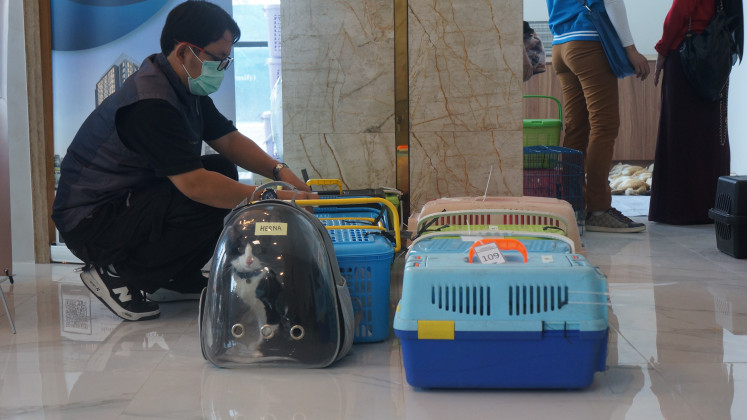Popular Reads
Top Results
Can't find what you're looking for?
View all search resultsPopular Reads
Top Results
Can't find what you're looking for?
View all search resultsWill offline stores still be relevant in the future?
As the end of 2017 approaches, several popular department stores in Indonesia are set to close.
Change text size
Gift Premium Articles
to Anyone
As the end of 2017 approaches, several popular department stores in Indonesia are set to close.
Back in September, retail firm PT Matahari Department Store closed two of its outlets in South Jakarta. The firm is said to shut down two more outlets this year.
Meanwhile Lotus Department Store in Central Jakarta reportedly closed down its business in October and British retailer Debenhams will follow suit at the end of this year.
Fetty Kwartati, head of local lifestyle retailer MAP, said that offline stores were largely affected by the growth of e-commerce in Indonesia.
But according to Paul Srivorakul, co-founder and group CEO of aCommerce, an e-commerce enabler and e-distributor in Southeast Asia, brands still need to use multi-channels to survive, including offline stores.
“At the beginning of the region’s adoption of online, it was enough to simply have a website,” Srivorakul stated during the 2018 Retail Trends: ASEAN’s Future media workshop on Monday. “Fast forward a few years later and brands are realizing that in order to stay ahead of the retail game, they need to be omnipresent and data hungry to fully control all pricing and consumer touch points.”
Srivorakul continued that consumers would not look at offline or online stores in a separate way. “They want to buy [a product] online, they want to return it to the store. They want to buy [a product] online, they want to pick it up from the store. So, everything is going to go basically across all channels and we call it multi-channel,” Srivorakul explained.
Read also: China's tech giants reach global elite with gamers, shoppers
Taking part in the 2018 Retail Trends: ASEAN’s Futur' media workshop media workshop on Monday at Ayana MidPlaza Hotel, Jakarta are (from left to right) aCommerce's Indonesia CEO Patrick Vaz, country sales manager of HP Indonesia Firmansyah Is Nursal, head of e-commerce Eiger Indonesia Andreant Tendo and aCommerce's co-founder and group CEO Paul Srivorakul. (aCommerce/File)Andreant Tendo, e-commerce head of adventure-related local retailer Eiger Indonesia, said that offline stores needed to continue operating more as experiential stores instead of becoming the center of the business. “When a consumer gets inside the store, he or she will be able to get engaged with the brand,” Andreant said during the workshop. “When they feel they’re being accepted in the store, they will shop. Selling will be the last thing.”
Although offline outlets may still be relevant in the future, technology will still come first. “Before I use the service, first of all I want to research, I want to know what the ratings and reviews are and also what my friends think and recommend on Facebook,” said Srivorakul. “And now when they actually want to buy something, they will just use Google.”
Patrick Vaz, Indonesia CEO of aCommerce, explained the two factors that brands should have in order to survive. Apart from having multi-channels that include both online and offline, brands should also have the capacity for distribution across Indonesia. “Now if people in Aceh have to wait 10 days [to get the product], it would be better for them to go to local department stores,” Vaz said.
Although e-commerce in Indonesia is growing, Srivorakul spotted a challenge within. “If you don’t have e-commerce manager in the company, it’ll be difficult to work with because you need people who understand the business from the inside,” Srivorakul stated, adding that time would be invested during the working process as it took around a year to see the numbers grow. (kes)











